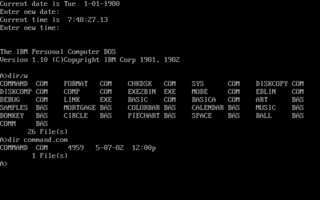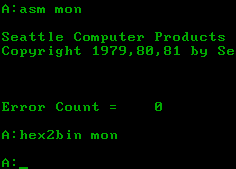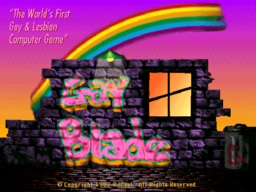
The Commodore 64, also known as the C64, is an 8-bit home computer introduced in January 1982 by Commodore International. It has been listed in the Guinness World Records as the highest-selling single computer model of all time, with independent estimates placing the number sold between 12.5 and 17 million units. Volume production started in early 1982, marketing in August for US$595. Preceded by the VIC-20 and Commodore PET, the C64 took its name from its 64 kilobytes(65,536 bytes) of RAM. With support for multicolor sprites and a custom chip for waveform generation, the C64 could create superior visuals and audio compared to systems without such custom hardware.
Shareware is a type of proprietary software that is initially shared by the owner for trial use at little or no cost. Often the software has limited functionality or incomplete documentation until the user sends payment to the software developer. Shareware is often offered as a download from a website. Shareware differs from freeware, which is fully-featured software distributed at no cost to the user but without source code being made available; and free and open-source software, in which the source code is freely available for anyone to inspect and alter.

IBM PC DOS, also known as PC DOS or IBM DOS, is a discontinued disk operating system for the IBM Personal Computer, its successors, and IBM PC compatibles. It was manufactured and sold by IBM from the early 1980s into the 2000s. Developed by Microsoft, it was also sold by that company as MS-DOS. Both operating systems were identical or almost identical until 1993, when IBM began selling PC DOS 6.1 with new features. The collective shorthand for PC DOS and MS-DOS was DOS, which is also the generic term for disk operating system, and is shared with dozens of disk operating systems called DOS.

The Family Computer Disk System, commonly shortened to the Famicom Disk System, or just Disk System, is a peripheral for Nintendo's Family Computer home video game console, released only in Japan on February 21, 1986. It uses proprietary floppy disks called "Disk Cards" for cheaper data storage and it adds a new high-fidelity sound channel for supporting Disk System games.

A gamer is a someone who plays interactive games, either video games, tabletop role-playing games, skill-based card games, or any combination thereof, and who often plays for extended periods of time. Originally a hobby, gaming has evolved into a profession for some, with some gamers routinely competing in games for money, prizes, or awards. In some countries, such as the US, UK, and Australia, the term "gaming" can refer to legalized gambling, which can take both traditional and digital forms, such as through online gambling. There are many different gamer communities around the world. Since the advent of the Internet, many communities take the form of Internet forums or YouTube or Twitch virtual communities, as well as in-person social clubs. In 2021, there were an estimated 3.24 billion gamers across the globe.

86-DOS is a discontinued operating system developed and marketed by Seattle Computer Products (SCP) for its Intel 8086-based computer kit.
Lesbian, gay, bisexual, and transgender (LGBT) characters have been depicted in video games since the 1980s. Throughout the history of video games, LGBT characters have been almost nonexistent for a long time, reflecting the overall heteronormativity of the medium. While there has been a trend towards greater representation of LGBT people in video games, they are frequently identified as LGBT in secondary material, such as comics, rather than in the games themselves. Often, LGBT characters and themes, when they are included, are underrepresented, minimized, or watered down. Queer games and characters have also often found themselves being the subjects of cultural crossfires or moral panics. In 2018, Sam Greer of GamesRadar+ found only 179 games commercially released games with any LGBT representation, only 83 of which have queer characters who are playable characters, and only 8 of those games feature a main character who is pre-written as queer as opposed to them being queer as an option.
This article details versions of MS-DOS, IBM PC DOS, and at least partially compatible disk operating systems. It does not include the many other operating systems called "DOS" which are unrelated to IBM PC compatibles.

Mystery House is an adventure game released by On-Line Systems in 1980. It was designed, written and illustrated by Roberta Williams, and programmed by Ken Williams for the Apple II. Mystery House is the first graphical adventure game and the first game produced by On-Line Systems, the company which would evolve into Sierra On-Line. It is one of the earliest horror video games.
Amiga software is computer software engineered to run on the Amiga personal computer. Amiga software covers many applications, including productivity, digital art, games, commercial, freeware and hobbyist products. The market was active in the late 1980s and early 1990s but then dwindled. Most Amiga products were originally created directly for the Amiga computer, and were not ported from other platforms.

Gabriel Knight: Sins of the Fathers is a 1993 point-and-click adventure game, created by Jane Jensen, developed and published by Sierra On-Line, and released for MS-DOS, Macintosh, and Windows on December 17, 1993. The game's story, featuring the voices of Tim Curry, Leah Remini, and Mark Hamill in the CD-ROM version, focuses on Gabriel Knight, a struggling novelist, whose decision to use a spate of recent murders around New Orleans as material for a new novel, leads him into a world of voodoo magic and the truth about his family's past as supernatural fighters.

Carol Shaw is one of the first female game designers and programmers in the video game industry. She is best known for creating the Atari 2600 vertically scrolling shooter game River Raid (1982) for Activision. She worked for Atari, Inc. from 1978 to 1980, where she designed multiple games including 3-D Tic-Tac-Toe (1978) and Video Checkers (1980), both for the Atari VCS before it was renamed to the 2600. She left game development in 1984 and retired in 1990.
Blue Board is a bulletin board system software created by Martin Sikes (1968–2007) for the Commodore 64 in the 1980s in Vancouver, British Columbia, Canada, and sold worldwide. Due to optimized code and memory allocation, Blue Board boasted very fast performance for a BBS on that hardware platform. In fact, Blue Board was faster than most if not all BBSs run on 8-bit computers. This speed combined with its use of the ASCII character set and XModem file transfer protocol rather than PETSCII and the Commodore-specific Punter protocol sometimes led users to believe that they were calling a BBS running on a much larger and faster computer.

The portrayal of gender in video games, as in other media, is a subject of research in gender studies and is discussed in the context of sexism in video gaming. Although women make up about half of video game players, they are significantly underrepresented as characters in mainstream games, despite the prominence of iconic heroines such as Samus Aran or Lara Croft. Women in games often reflect traditional gender roles, sexual objectification, or stereotypes such as the "damsel in distress". Male characters are frequently depicted as big and muscular, and LGBT characters have been slow to appear due to the cis-heteronormativity of the medium.

Scene World Magazine is a disk magazine for the Commodore 64 home computer. The magazine has been released regularly since February 2001.
Adrienne Shaw is an American game studies scholar and Associate Professor at Temple University in the Klein College of Media and Communication. She is known for her work on queer theory and LGBTQ representation in video games. She is the author of Gaming at the Edge: Sexuality and Gender at the Margins of Gamer Culture, the co-editor of Queer Game Studies, and the founder of the LGBTQ Video Games Archive.

GayBlade is an action role-playing video game developed by Ryan Best and released in 1992. Among the earliest of LGBT-themed video games, and long considered lost, a recovery effort by the LGBTQ Video Game Archive resulted in a playable emulation in 2020.











